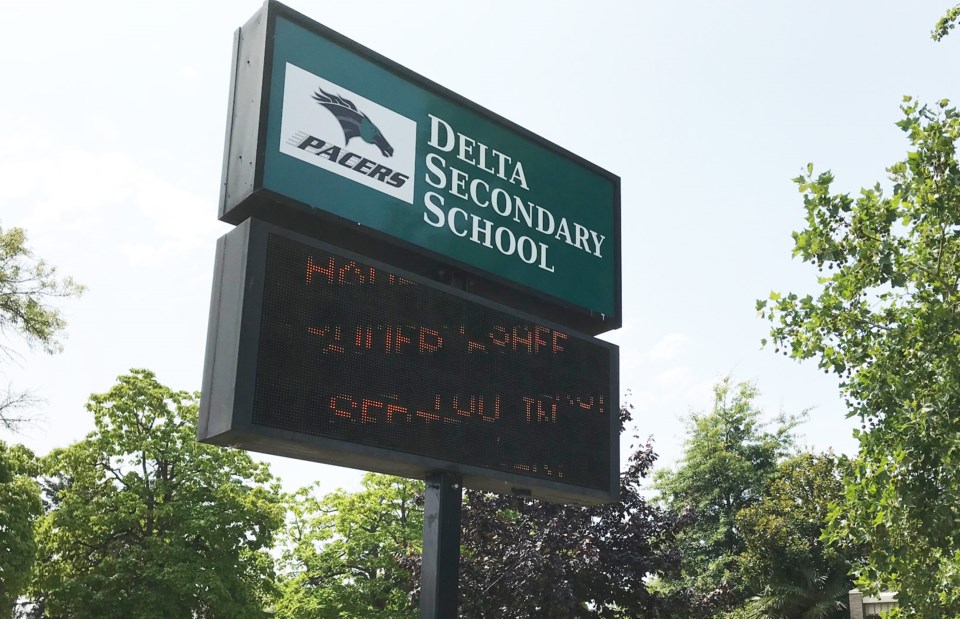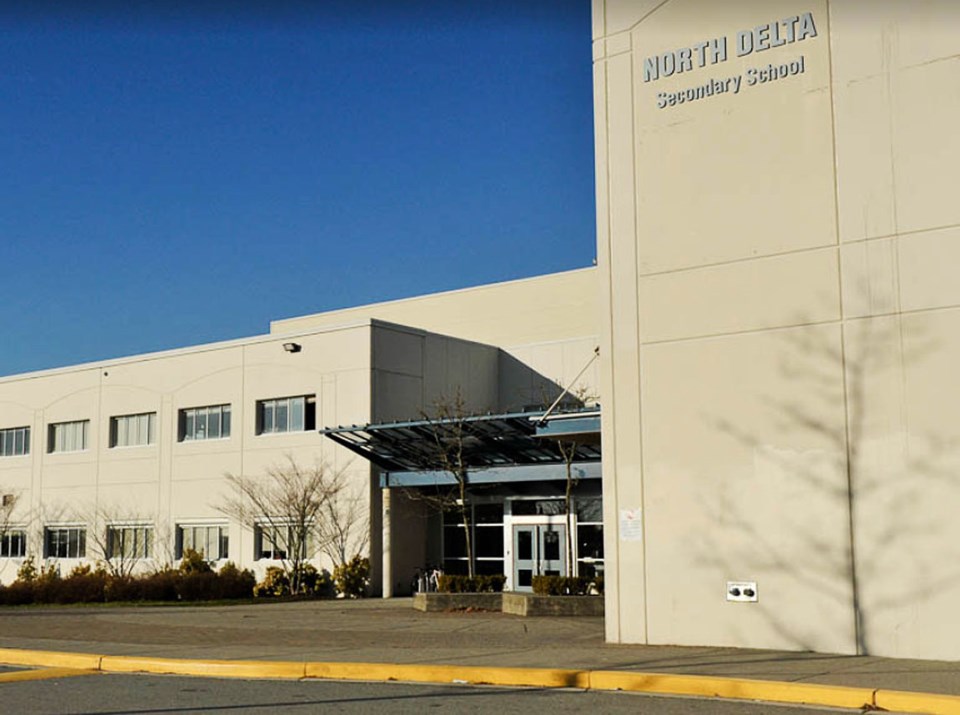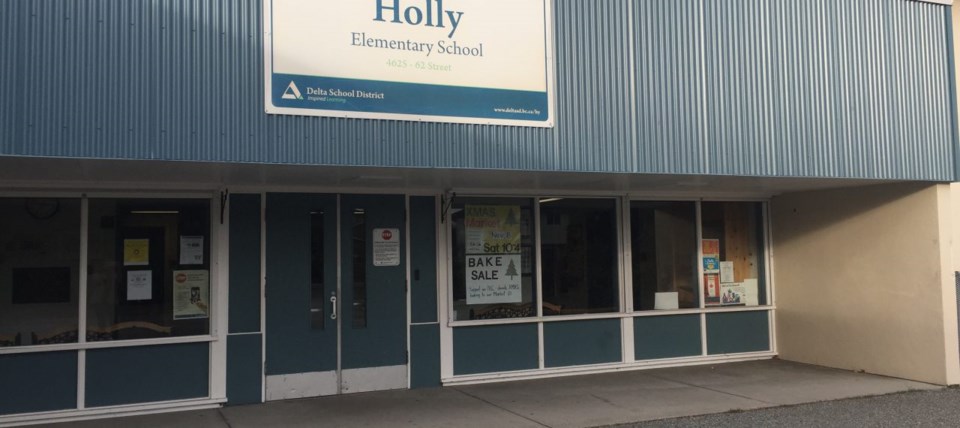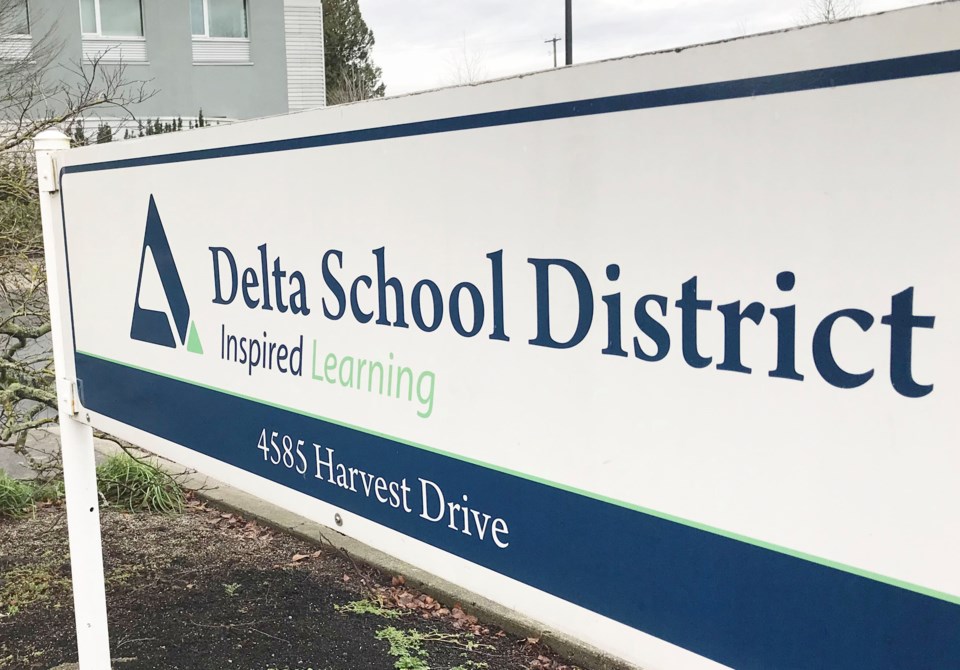The Delta school district could be on the hook for many millions of dollars due to a thermal energy deal with FortisBC which has gone sour for the local board of education.
Several years ago the district entered into a deal with FortisBC Alternative Energy Services Inc. that saw the replacement of conventional natural gas boilers with new technology, including a combination of high efficiency natural gas boilers and ground source heat pumps, the geoexchange component of the project, at 19 building sites including schools. Geo-exchange heating and cooling is done through the use of ground source heat pumps, which work by transferring underground heat and circulating it through a building.

They were all smiles at a groundbreaking that took place at Neilson Grove Elementary in October 2012 to celebrate the construction of a thermal energy facility, a partnership between the school district, FortisBC and the B.C. Ministry of Environment. Pictured (from left): district facilities manager Frank Geyer, FortisBC's Jason Wolfe, Advanced Education Minister John Yap and school board chair Dale Saip.
In a 2012 announcement that had much fanfare, it was noted the $6.4 million investment into the thermal energy production facilities, which received B.C. Utilities Commission approval and also involved the B.C. Ministry of Environment, would lower the district’s carbon footprint by an estimated 45 per cent reduction in energy usage, equivalent to enough natural gas of about 365 homes a year.
A 20-year-deal, greenhouse gas emissions in the district were expected to drop by 69 per cent as a result of the initiative, which is equivalent to the removal of almost 450 cars from the road annually.
At the time it was also noted the province’s mandate that all public sector organizations be carbon neutral resulted in the school district having to purchase carbon offsets to the tune of $100,000 a year.
The FortisBC project would eliminate the need to purchase the offsets. The savings, combined with substantial cost savings from reduced natural gas usage, would mean the district was expected to save $180,000 a year through the initiative.
"We're thrilled about the positive impact this FortisBC partnership will have on our bottom line and our environmental footprint," said district facilities manager Frank Geyer at the time.
A grant through the Public Sector Energy Conservation Agreement provided the Delta district $1.4 million.
Fortis paid the remainder and provided the district with a so-called “market rate” rather than a “cost of service rate” which would have been higher.
Last year Fortis appeared before the B.C. Utilities Commission, applying to not only switch to the higher rate, which is now about $1 million difference, but also get a back payment amount from the beginning of the project for the difference, which totals almost $4 million.
The BCUC process will culminate this month with both parties submitting their final arguments.

An example by Fortis of a geo-exchange system
Appearing before the commission last year on behalf of the district, which is disputing the Fortis application, legal counsel Dionysios Rossi said, “The impact on my client's financial position is going to be very significant…school boards are legislatively prohibited from running deficits year to year. So the estimated $1 million in additional costs that will result from a switch to the cost of service rate at this time is going to have to come out of the program budget by which the district operates its schools.”
He also asked the panel to carefully consider with the consequences of the upcoming decision because “we're talking about an increase in its budget of about a million dollars a year for the next 15 years.”
A spokesperson for FortisBC told the Optimist the negotiated and approved contracts between the district and Fortis establish that after a period of time the district and can elect to pay the cost of service rate or Fortis can apply to the commission to charge that rate.
The contracts also set out a rate to recover the annual cost of service Fortis incurs in providing thermal energy to the district’s buildings. The contracts include a transitional market rate to be in place for a period of time prior to charging the cost of service rate, and an associated Delta deferral account collects the cumulative difference between the revenues and cost of service during the transitional period.

Delta Secondary was one of the school sites part of the FortisBC energy deal, using a Closed Loop Geo-Exchange System which uses a continuous loop of buried polyethylene pipe. The pipe is connected to the indoor ground source heat pump to form a sealed, underground loop through which an environmentally-friendly antifreeze-and-water solution is circulated.
Someone familiar with the deal when it was devised told the Optimist the cost of service rate was expected to be lower than what Fortis is now seeking because more customers were expected to sign up to be part of the thermal energy initiative, but the interest wasn’t there, which now leaves Delta on the hook to pay much more than anticipated.
Fortis in its submission stated the anticipated thermal energy demand used to calculate the market rate did not materialize and that any further delay in switching to the new rate “will exacerbate the impact to the DSD (Delta school district) when the switch occurs.”
When it approved the original deal, the utilities commission wrote that it was concerned with the cost risks of the district assuming a cost of service model with Fortis.
“Delaying payment of the COS (cost of service) rate any further will harm both the DSD and FAES (FortisBC Alternative Energy Services). Growth and carrying costs of the DDA (district deferral account) balance will only increase DSD’s future costs and increase the financial risk to FAES. Further, ongoing use of the MR (market rate) not only precludes FAES from having reasonable opportunity to earn a fair return on its investment, but is also inadequate to even cover the cost of electricity, natural gas, and operating expenses. For these reasons. FAES submits that now is the appropriate time to charge the COS Rate,” a Fortis submission to the commission explains.

North Delta Secondary had an Air-to-Water Heat Pump System installed. The system absorbs heat from outside air and a heat pump compressor increases the temperature of that heat further. A heat exchanger then transfers the heat to the building’s hot water heating system.
“FAES has abided by the terms of the contracts, has been unsuccessful in negotiating a resolution with the DSD on this matter, has provided DSD with advance notice of its intent to make this Application, and has provided DSD with an advance copy of this Application.”
Fortis also notes its application “does not require a broader public interest determination,” adding, “FAES is sympathetic to DSD’s budgetary concerns to a point, but DSD is a sophisticated party. It has had the ability to budget appropriately, particularly when it has been benefitting from market rates that are even lower than the market rates that had been forecasted by the parties at the outset. The DSD has chosen to spend that unexpected benefit, rather than set it aside.”
Representing Fortis, Mathew Ghikas told the commission “while we can be sympathetic to Delta in its budgeting constraints, we should also be considering the fact that it really cannot, in a commercial arrangement, rely on its own budgeting practices as a defence to the enforcement of a commercial arrangement.”
He added “they want a different agreement, and in my submission, this is not the place to be arguing for a different agreement, it’s the place to enforce the agreement that the parties knew they had from the get-go.”
Fortis also stated the two sides had ongoing discussions about the service since its inception including the timing of when to begin paying the different rate, and that the two-to-five-year period for the transition has expired.
School board chair Laura Dixon referred a request for comment to a school board spokesperson, who told the Optimist the cost of service rate “has a number of components, but the basic principle is that: the more customers, the lower the Cost of Service Rate. At the time the ESRDA (Energy Systems Rate Development Agreement) was negotiated, the Cost of Service Rate was included as an option based on the expectation/commitment that FAES would market and attract many customers to its Alternative Energy Services group, resulting in the Cost of Service Rate being lower than the market rate and therefore more beneficial to Delta School District.”

Holly Elementary had a Condensing Boiler Upgrade. A condensing boiler extracts additional heat from waste gases by condensing the steam into liquid water, thus recovering its latent heat. A typical increase of efficiency can be as much as 10 to 12 per cent.
According to the district, issues the commission needs to determine include whether FAES can apply to the commission for approval to switch Delta to the cost of service rate at this time, whether the district should be switched to the rate at this time and, if it’s determined the district should be switched, whether the commission should approve the kilowatt-per-hour rate Fortis is seeking.
Representing the district, the law firm of Borden Ladner Gervais raised several specific issues including, among other things, “whether all the expenditures included in the DDA and the calculation of the COS Rate proposed by FAES were prudently incurred, and whether and to what extent such amounts should be recoverable by FAES as part of any COS Rate to which DSD is switched.”
The firm also noted “DSD maintains that the question of whether and to what extent FAES complied with its contractual obligation to design the heat pump systems to be operationally compatible with the pre-existing terminal equipment in DSD schools is a central issue in the Application proceedings.
Specifically, it is directly relevant to the question of whether the expenditures associated with those systems were prudently incurred by FAES, which, in turn, directly informs whether such costs should be recoverable by FAES.”
The firm also noted Fortis failed to provide specific information that was requested.
Fortis explains that while it’s seeking the higher rate that works out to about $1 million more annually from Delta, the roughly $4 million in back payment would only have to be paid off over the next 15 years.
The Delta board of education’s operating budget for this school year had a small surplus of just under $57,000, a sharp contrast from deficits in the millions that had been the norm for years.



